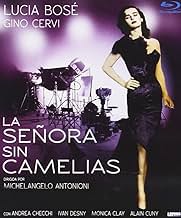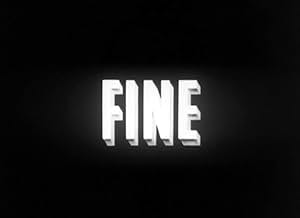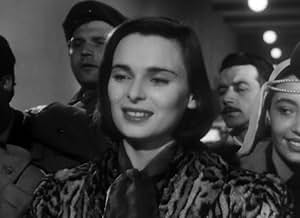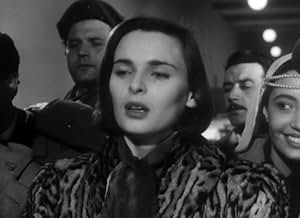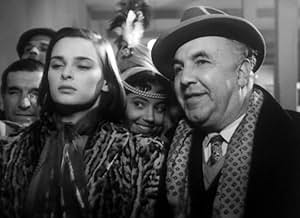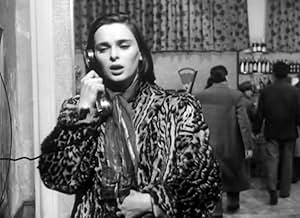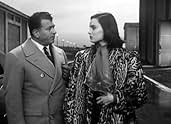AVALIAÇÃO DA IMDb
7,1/10
2,4 mil
SUA AVALIAÇÃO
Adicionar um enredo no seu idiomaA new starlet is discovered and has ups and downs in Italian films.A new starlet is discovered and has ups and downs in Italian films.A new starlet is discovered and has ups and downs in Italian films.
- Direção
- Roteiristas
- Artistas
- Prêmios
- 1 vitória no total
Antonio Acqua
- Movie Theatre Owner
- (não creditado)
Emma Druetti
- Simonetta Rota's Mother
- (não creditado)
Rita Giannuzzi
- Simonetta Rota's Friend
- (não creditado)
Vittorio Manfrino
- Clara Manni's Father
- (não creditado)
Avaliações em destaque
A usually neglected Michelangelo Antonioni early film, "The Lady without Camelias" is a caustic story about a beautiful Milanese shop clerk (Lucia Bosé) who briefly becomes a movie star. She soon discovers than she is fenced in and humiliated, with a new and rich husband who can't tolerate her romantic scenes -- he prefers her to play Joan of Arc, with disastrous consequences.
It is actually one of the cruelest and most accurate portraits of studio film-making and the Italian movie world. As the film develops, it only gets better, the last scene being a little masterpiece of its own. Michelangelo Antonioni, who had already worked with Bosé on "Chronicle of a Love Affair", offered her the part of Clara after Lollobrigida (and, it is said, Loren) had turned it down, and she does wonders in one of her best parts on the silver screen. I have never been really touched by Antonioni's (much more famous, much more serious) Trilogy, but I have enjoyed this "minor" work. Compared to later Antonioni, the film feels crowded, yet some of the director's favorite themes are already there (most notably, misunderstanding between men and women, and masculine weakness). For those (like me) who always found Antonioni quite hard to follow in his later films, try this bitter tale in post-war Italy, I think it gives a different and lighter approach to this director's work.
It is actually one of the cruelest and most accurate portraits of studio film-making and the Italian movie world. As the film develops, it only gets better, the last scene being a little masterpiece of its own. Michelangelo Antonioni, who had already worked with Bosé on "Chronicle of a Love Affair", offered her the part of Clara after Lollobrigida (and, it is said, Loren) had turned it down, and she does wonders in one of her best parts on the silver screen. I have never been really touched by Antonioni's (much more famous, much more serious) Trilogy, but I have enjoyed this "minor" work. Compared to later Antonioni, the film feels crowded, yet some of the director's favorite themes are already there (most notably, misunderstanding between men and women, and masculine weakness). For those (like me) who always found Antonioni quite hard to follow in his later films, try this bitter tale in post-war Italy, I think it gives a different and lighter approach to this director's work.
Early Antonioni and although he is clearly feeling his way there are already signs of what is to become. We open with a fairly busy street scene and it becomes apparent the camera is following a woman along the pavement as first she pauses at an advertising poster and then approaches a cinema entrance. We only see her from behind and she enters the cinema to see the closing moments of herself on screen. It will later become apparent she is the star/victim of our picture. Later half the picture is taken up with a blank wall forming the corner of a street and a couple disappear behind it. There are several instances in sun and rain of cars and people walking across squares and beside buildings where the space is as important as those walking in its midst. Storywise the tale is more mundane. A naive young lady becomes committed to marriage without her knowledge, becomes involved elsewhere and the conflicts in her personal life are reflected in the conflicts in her working life in the cinema. Antonioni seems not to be a fan of popular cinema and if your vision is as sound and persuasive as his would prove to be maybe this is fine and another kind of popularity can be achieved but it is something of a stretch. Much cinema dismissed in the day as trash has survived with notable potency and resonance of the time and place whereas much arthouse cinema has disappeared without trace with charges of pretentiousness. Here we see the birth of Antonioni and whilst throughout his career he would construct scenarios railing against the men who presumed to control his icy maidens it would be his cinema eye, his certainty that place affects personality, that would carry most weight through his golden period from the late 50s up until his majestic and final great work, The Passenger.
"La Signora senza Camelie" is arguably Antonioni's first masterpiece. It's about a shop-girl 'discovered' by an ambitious producer who doesn't just want to make her a star but his wife as well and who then proceeds to make her miserable. It's not a great film about the cinema but then that's hardly the point; rather you can see in it the seeds of his later films about unhappy women and mentally abusive men.
As the unfortunate Clara, rich and bored like so many Antonioni heroines, the little known Lucia Bose is excellent and visually it is often extraordinary. It doesn't quite fit into the broader and deeper contextualization of the trilogy that began with "L'Avventura" but in its treatment of its heroine it is unmistakably the work of its director and it's a much more intellectually rigorous picture than anything his contemporaries was doing at the time, For anyone remotely interested in following the trajectory of Antonioni's career this is essential viewing.
As the unfortunate Clara, rich and bored like so many Antonioni heroines, the little known Lucia Bose is excellent and visually it is often extraordinary. It doesn't quite fit into the broader and deeper contextualization of the trilogy that began with "L'Avventura" but in its treatment of its heroine it is unmistakably the work of its director and it's a much more intellectually rigorous picture than anything his contemporaries was doing at the time, For anyone remotely interested in following the trajectory of Antonioni's career this is essential viewing.
10andrabem
Clara Manni (Lucia Bosé), a shop clerk, came to Rome in order to become an actress. She was discovered by Gianni (Andrea Checchi), a film producer. Now it seems that she's hit the big time. The film she's making now is bound to be a success. She's a star on the rise. Gianni, the producer, is in love with her, and rushes Clara into marriage with the complicity of her parents. She's not really in love with him but marries him all the same. Marriage at the time was a kind of moral (if not financial) safety certificate. This, by the time (1953), was almost mandatory for women.
The marriage is not successful and new roads, provided by chance, offer themselves to her. Clara is a sensitive woman, capable of deep emotions - she gives all of herself in whatever she does. But appearances seem to be more important than feelings in this world. In the end of the film, the tears she sheds while she's smiling, represent her surrender.
Lucia Bosé is superb in her role. Clara's need for love, her hesitations and hopes, are subtly shown - her acting is at the same time minimalistic and full of passion. More than the world of cinema, Antonioni portrays the world in which women had to live at that time. His look is deep and compassionate.
See a very beautiful and sad film about a "lady without camelias" - she lived, loved, suffered, and learned - in the end the flowers were gone and nothing remained but a smile among tears.
The marriage is not successful and new roads, provided by chance, offer themselves to her. Clara is a sensitive woman, capable of deep emotions - she gives all of herself in whatever she does. But appearances seem to be more important than feelings in this world. In the end of the film, the tears she sheds while she's smiling, represent her surrender.
Lucia Bosé is superb in her role. Clara's need for love, her hesitations and hopes, are subtly shown - her acting is at the same time minimalistic and full of passion. More than the world of cinema, Antonioni portrays the world in which women had to live at that time. His look is deep and compassionate.
See a very beautiful and sad film about a "lady without camelias" - she lived, loved, suffered, and learned - in the end the flowers were gone and nothing remained but a smile among tears.
About sex and cinema 'The Lady Without Camelias' reaches new heights in technical quality and sexiness, for Antonioni, whilst thoroughly dismantling the superficiality of cinema.
Você sabia?
- CuriosidadesMichelangelo Antonioni offered the lead to Lucia Bosè after both Gina Lollobrigida and Sophia Loren turned it down.
- Citações
Clara Manni: I was thinking of eternal love, all he wanted was an affair with a film star. And he got it.
- ConexõesFeatured in Michelangelo Antonioni storia di un autore (1965)
Principais escolhas
Faça login para avaliar e ver a lista de recomendações personalizadas
- How long is The Lady Without Camelias?Fornecido pela Alexa
Detalhes
- Data de lançamento
- País de origem
- Idioma
- Também conhecido como
- The Lady Without Camelias
- Locações de filme
- Empresas de produção
- Consulte mais créditos da empresa na IMDbPro
- Tempo de duração1 hora 41 minutos
- Cor
- Mixagem de som
- Proporção
- 1.37 : 1
Contribua para esta página
Sugerir uma alteração ou adicionar conteúdo ausente

Principal brecha
By what name was A Dama sem Camélias (1953) officially released in Canada in English?
Responda
![Assistir a Trailer [OV]](https://m.media-amazon.com/images/M/MV5BMmVmZGM2NWQtMWZkNS00ZmI5LWEwMjctOTE2Njc4MjRiYmFlXkEyXkFqcGdeQXRyYW5zY29kZS13b3JrZmxvdw@@._V1_QL75_UX500_CR0)
